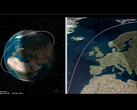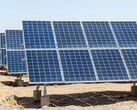The Photonera, a new power bank with an integrated solar cell, is currently being funded on Kickstarter. Such devices are not unusual, but the system does have one special feature: it is said to be able to output up to 65 watts via USB PD, which is a relatively high charging capacity. This means that compatible notebooks can be recharged and not just smartphones. In theory, it is thus possible to work with a notebook for extended periods of time in the absence of any other charging solution and only with the power of the sun via the Photonera, provided there is strong and plentiful sunlight. The power bank's capacity is specified as only 10,000 mAh, so notebooks with a large battery are unlikely to be fully charged. A display is available.
The system is equipped with 10 individual solar panels, which can then be unfolded. When folded, the device measures 96 x 146 x 40 millimeters; when unfolded, it measures 278 x 480 x 22 millimeters. The output of the solar cells is stated as 25 watts, which is the maximum output that can only be achieved in full sunlight. The weight is stated as 560 grams. Alternatively, the power bank can be charged with up to 65 watts via USB-C. In addition to the USB-C port, the model also has a USB-A port, which can output power at 24 watts.
The Photonera can currently be ordered via Kickstarter at a starting price of around $79. Potential supporters should be aware of the financial risks of crowdfunding campaigns.
























